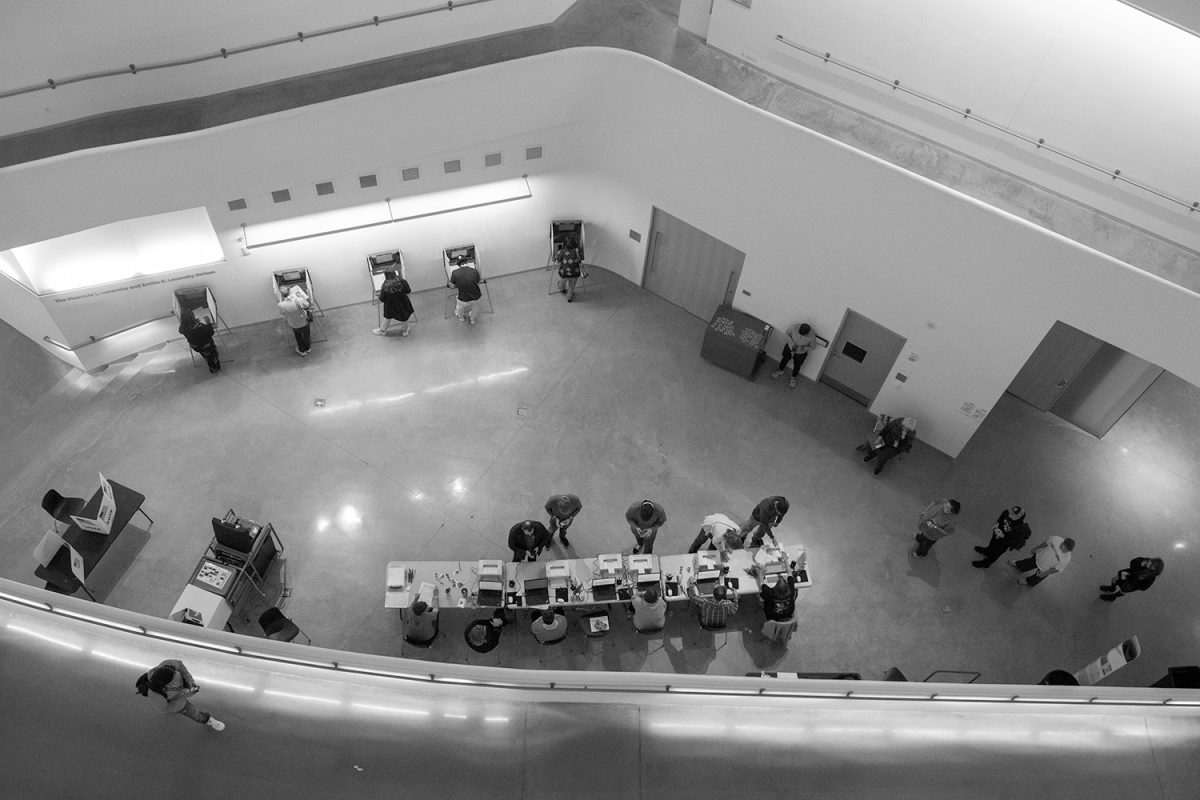A handful of University of Iowa students were among hundreds of poll workers who helped run dozens of election precincts in Johnson County on Election Day. The students, however, were getting class credit.
The class focused on election administration and gave students hands-on experience working long hours at precincts in Iowa City.
Taught by Alex Smith, a professor in the political science department, the class featured lectures and assigned readings coupled with practical experience, as students underwent poll worker training at the Johnson County auditor’s office and then worked at the polls on Election Day.
Joseph Faliszek, a third-year UI student, was among the students in Smith’s class who worked at the polls on Tuesday. Faliszek worked for more than 15 hours at the precinct at Robert A. Lee Recreation Center.
Faliszek took the class partly for practical reasons — he needed a 3000-level course for his degree — and also because this year’s election inspired him to learn more about the election process.
Given the long hours, Faliszek said that he went into autopilot mode as he worked at the polls.
“It was really simple,” Faliszek said, describing the process of scanning voter IDs, registering voters, and ultimately declaring their eligibility to vote.
Faliszek said that about 920 people voted at his polling place, with around 400 being same-day registrations. Faliszek said that at one point the master computer at Robert A. Lee shut down, so for about an hour the process was completely analog, and the precinct chairperson brought out a book of registered voters in Johnson County.
Though Faliszek said the process was monotonous at times, he said it was an enriching experience.
He said that spending a day as a poll worker revealed to him the resilience of poll workers. Faliszek described the workers as having tunnel vision, taking everything in stride to make sure that every ballot is counted efficiently and correctly.
Sophia Elgin, a third-year UI student majoring in political science, said that she chose to take the election administration class partly because she appreciated Professor Smith’s unbiased and nonpartisan teaching style.
“Hearing that I would be able to work with Johnson County as a credit with Dr. Smith was very intriguing to me,” Elgin said.
On Election Day, Elgin worked at Tate High School for roughly 15 hours, and during this time, a little over 500 people voted at the high school, and around 1,000 in the precinct had voted early.
Working at the polls for the first time. Elgin said she was amazed by the level of professionalism needed to move the process along. She said that organization during the process was paramount to ensuring that there were no discrepancies in the validity of ballots, and poll watchers observed the process to make sure that no one was engaging in partisan conversation.
Smith’s class and Elgin’s training at the Johnson County auditor’s office were what she said taught her the most about election administration, but the polls also helped her understand the real challenges that election administration faces while in practice. She said that throughout the day, there were a few Spanish-speaking voters who came into the high school. However, Iowa doesn’t offer Spanish language ballots, so each of the voters had an assistant, like a son or daughter, who could help them read their ballots.
“That was a moment where I felt like we could definitely improve the election administration,” Elgin said.
Elgin said that overall, her day at the polls helped her understand how extreme professionalism and organization make it difficult for discrepancies or issues to arise in the voting process.
“Being able to do it hands-on was an unforgettable experience and definitely motivated me to continue to do that,” Elgin said.
Smith said that Political Science Department Chair, Brian Lai spoke to him about how election integrity has been a growing topic in American elections discourse, and how a class on this issue could be beneficial to political science students.
The department also has alumni working at the Johnson County Auditor’s Office, so the class could help fill their need for volunteers as well.
RELATED: Young voters in Iowa take to the polls
The objectives of the class are to help students gain practical experience in election administration, understand various topics and controversies related to election administration, differentiate between election laws and procedures of state and local governments and assess the accuracy of perceived controversies related to election administration.
Smith said that students had discussions about different aspects of the election administration process and the problems that come with it. Lectures touched on subjects like how media outlets call races, different kinds of election reform, and what causes election official turnover.
The class also addressed issues unique to this year’s election, like the burning of ballot boxes in Washington and Oregon, and assessed how issues like this can be prevented, how election administration officials contact voters whose ballots were burned, and how to ensure legal ramifications for those responsible.
The benefit of this, Smith said, was both that students were able to learn more about election administration and integrity through real experiences and that students could be introduced to potential career options.
“I think there are students who see it as a way to be involved in pursuing their interest in government politics, and to be an active contributor to that process and to making it work, rather than just going casting their vote and not thinking about elections and politics again for two years or four years when the next cycle happens,” Smith said.
Smith’s students’ excitement about election administration overall, has been what Smith has found most rewarding about the class.
“That always makes me happy as the instructor, when students feel like the class is worth their while when they feel like it’s a good experience for them, and that we’re learning things that are appropriate or that are helpful to learn and to know,” Smith said.



